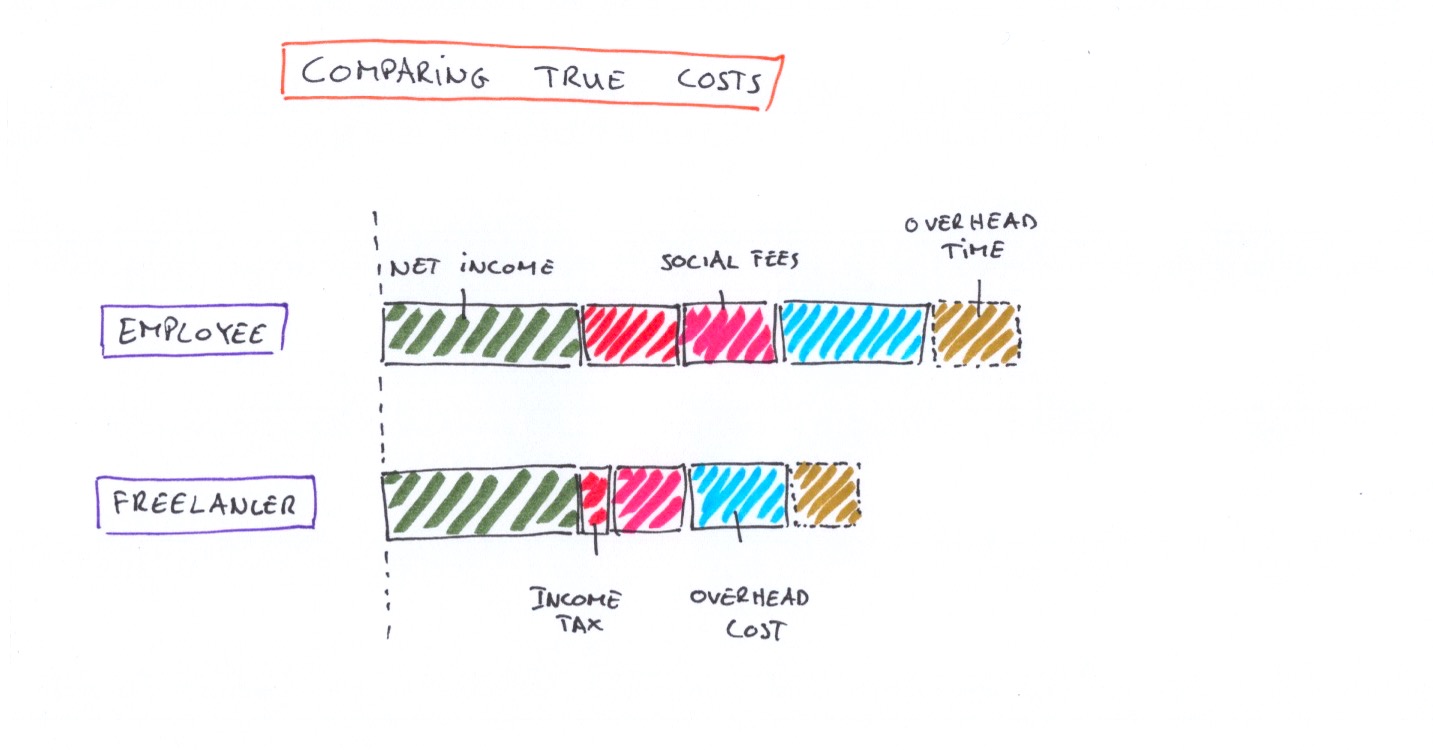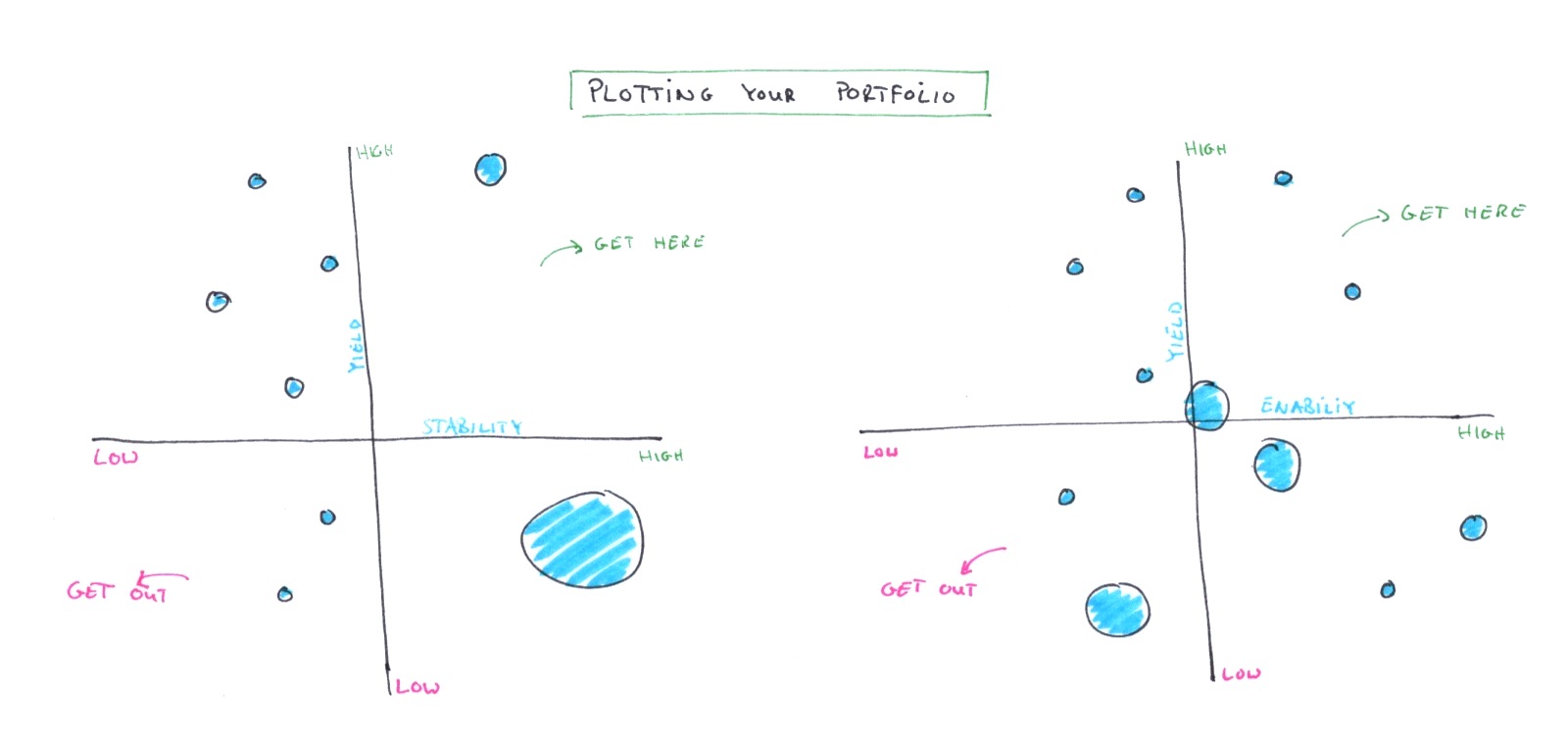
Two types of entrepreneurship: The Freelancer and the Entrepreneur
What type of entrepreneurship are you in?
Entrepreneurship is a big term. A bit too big. Knowledge or advice about entrepreneurship is inherently only applicable to some of it.
By breaking it up into the two main and very distinct types, it helps you see more clearly what the right strategy and path for growth is. And to know what not to do.
So, which one are you? Are you a "Freelancer" or an "Entrepreneur"?

Pricing 4: How to Price based on Value and Perception.
A business works because it sells something at a price that is less than what it's worth to its clients. How do you base your prices on the value you deliver? What's the role of the client's perception of you in all of this?

Pricing 3: Why freelance fees aren't as high when you compare them with the true costs of employees.
You charge what per hour?? The outcry you get when you share how much you charge to people who work a regular job. But what if these fees aren't as high as they seem? What if we would compare them to the true costs to the employer of that person? If we add all the costs and calculate the costs per hour, the freelancer fees seem way more reasonable.

Pricing 2: How to figure out what your hourly rate should be.
There are roughly three ways to approach the price of your product. (1) Most logically is to base it on the value you deliver to the client. (2) To look at the price on the market for similar products. (3) And lastly, there is Cost-plus. To price your product or service based on what it costs you and put a margin on top of it.

Pricing 1: How much do you need to charge to earn your income goal?
Pricing is foundational to your business. You sell products. And products have a price. Now, what do you need to price in order to make your income goals? This posts breaks down exactly that.
It's the first part of a series on pricing. Going further in internal budgeting, value and perception, and whether you should ever work for free.

Seth Godin's Startup School
A course I really enjoyed listening to. I'm a big fan of Seth Godin because he's such an original thinker. So it was great to get insight a 3-day course where he teaches the ins and outs about starting and marketing a company.

StartUp – Gimlet Media
Gimlet's first podcast and still the one I enjoy the most. Follow Alex along all his struggles in starting this company and tear up when he and Matt get together as co-founders. Since then they have also started great other shows like Reply All and the Mystery Show. And their current fall lineup is looking really strong!

Guardian - Still ticking: The improbable survival of the luxury watch business
We still buy watches even when we don’t really need them. And Swiss manufacturers manage to have 60% of the global watch market value while only producing 2% of them. Why is there such a high-paying market for them? Well, it’s the only jewellery a man wears. It’s also a result of a long process – the end of a feat of infinitely intricate human engineering – that appeals to the watch connoisseur.

Seth Godin - 7 unconventional rules for getting clients
Love these gems from Seth Godin. Fire bad clients! Challenge clients to demand your best work. You have to make the choice. Don’t wait for advise or guidance from the client. Check them out.

Jory MacKay - The psychology of persuasion
Learn the persuasion techniques from the 3 professions that use them best (yet maybe not in the most savoury way): Sales people, con artists and politicians. Now go use these techniques for good!

Matthew Stewart - The Management Myth
A rant of a trained philosopher and former consultant on MBA’s and Management ‘Science’. In a somewhat bitter way philosophers can, he lays bare the flaws in the science. I think the lesson is to check what the models or conclusions are based on. And to use it for what it’s worth

Ionica Smeets - Over fatsoenlijke tarieven
This column that I’ve already shared numerous times with individuals had to make the favorites. Here, Ionica clears up that while a freelance fee might sound expensive, it’s actually very reasonable. Of course, that still says nothing about the worth of the service or product. But it’s good for all freelancers to know what their minimum hourly fee should be.

Dan Pallotta (TED) - The way we think about charity is dead wrong
NGOs have to play by different rules than companies. NGO’s have to be very conservative in areas like compensation, marketing, taking risks, the time pressure and profits. The nature of working with donations causes some of it. But when we see that it cripples these organizations that do good work. Why do we continue with this story? Dan Pallotta delivers a great and clean talk to address this.

Tomas Chamorro-Premuzic (HBR) - Why do so many incompetent men become leaders?
This article tries to explain why we have so many more men in management than women. It goes about it differently than the usual they’re incapable, they’re uninterested or glass ceiling reasons often given. And that is most welcome! It looks at the way we choose leaders. Turns out, the criteria that make candidates look good are exactly the ones that make bad leaders. We just seem to like self-centeredness, overconfidence and narcissism. And these ‘qualities’ are not equally present in men and women.

Interview with David Graeber - “Bullshit jobs & how bizarrely skewed our economy is”
Iemand die de term “bullshit jobs” verzint mag ik natuurlijk wel. Daarnaast legt hij wel mooi de vinger op de zere plekken. Hoe komt het dat hoe meer je werk mensen helpt hoe minder het betaalt ("als het werk al intrinsieke waarde heeft, waarom moet je er dan voor betaald worden?”). En werk is op zichzelf toch iets heel waardevols? Dus doe dan maar druk! En waarom zijn we eigenlijk meer gaan werken in plaats van minder? En waarom is het meeste van al dat extra werk eigenlijk niet echt iets dat waarde toevoegt?
